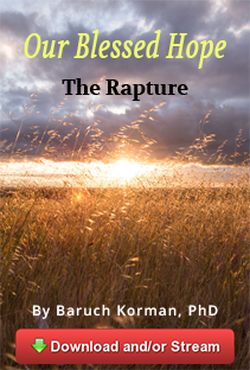Speaker 1
Shalom. And welcome to Via Hafta Yisrael, a Hebrew phrase which means you shall love Israel. We hope you'll stay with us for the next 30 minutes as our teacher, Dr. Baruch, shares his expository teaching from the Bible.
Dr. Baruch is the senior lecturer at the Zarah Avraham Institute, based in Israel. Although all courses are taught in Hebrew at the institute, Dr. Baruch is pleased to share this weekly address in English.
To find out more about our work in Israel, please visit us on the web at loveisrael.org—that's one word, loveisrael.org.
Now here's Baruch with today's lesson.
Speaker 2
Now, as we learned in our call to worship, there is a glorious end for those who walk in the fear of the Lord. And that word "walk" speaks of a lifestyle. It speaks of a commitment to behave in God's will, being committed to His purposes and understanding the knowledge of the Lord. For what purpose? That we might implement His truth in our life. So again, I remind you to turn to that location where we concluded last week: the book of Proverbs and chapter 23.
Now, in the New Covenant, we have a word, and that word is "sober." Sober has to do with thinking correctly in light of the truth of God. And we want to be sober-minded. Now, oftentimes when we talk about sobriety, we're talking about the opposite of being drunk. In this 23rd chapter, much of it, and I want you to hear this, speaks about the foolishness of alcohol, including strong drink and even wine. So we need to realize that if we're going to be found in God's will, and we're going to be doing His purposes, and we're going to be found faithful when our life comes to an end, we don't want to be under the influence of alcohol. Rather, we want to be under the influence of the fear of the Lord.
So let's begin. Let's look again at where we began a few minutes ago in our call to worship, verse 18, where it speaks about something that is different, that there's going to be a different end for those who behave and think according to the fear of the Lord. What do we read, rather, meaning for those individuals who are committed to God's truth, His ways, and His purposes? There is an end that is very different. And what does that end speak about? Well, it speaks about in the next part of verse 18, your hope. Your hope will not be cut off. What it is, is a promise from God that the commandments of God and the covenant of God are going to work in your life in order to be a blessing. Why is that? Well, a very simple truth that we always need to remember is the cross.
Now, if we can focus in on one thing and understand it properly, it ought to be the cross. The cross is tied to the judgment of God. Let me say it this way: because Messiah was crucified, we know truly that God judges sin. God is not going to wink at sin, ignore sin, or embrace sin. No, we see that God punishes; He judges sin. Sin brings about the wrath of God. Now, when Messiah was crucified and died, we know that He who knew no sin became sin for us. God did not punish Yeshua on the cross. That is a false understanding. What God did was He judged sin. And obviously, Messiah was without sin. But as the Scripture says, the sins of the world were placed upon Him. He never sinned. He is eternally righteous like His Father, but He became sin for us.
Now, it wasn't that Satan tricked God, but rather God's plan from before the foundations of the earth was to use His only begotten Son for redemption. That He who was that perfect lamb of God, who had no spot, no fault, no defect, but holy in every way, laid down His life, taking the judgment of God that should have been upon us. And He was a substitute for us. Why? So that we could have that hopeful end that we talk about in verse 18, and that hope will not be cut off. That is a promise from God.
Move on to verse 19. It says, "Hear you, my son." So you who are a son of your Father, you are to hear this. Now again, this word for "hear" means to respond. You hear something, and you are being called to respond to what you have heard. So you hear this, my son. And then next it says, "and be wise and walk." Now this next word is a word of not so much guidance as many Bibles will say, but it's a word of moving forward, walking in the right direction, someone that has understanding. And we see what the basis is for that understanding. What does he say prior to this word? "Be wise." So, so here, my son, you need to hear this. Be wise and move forward in the way of your heart.
Now when it says "your heart," the implication is a heart that has been established by God. Now we know that there's a circumcision of the flesh. But also the Scripture speaks about that inward work of God to circumcise our hearts. Why? Well, circumcision speaks about the death of the flesh. And we don't want a fleshly heart, meaning we don't want to think according to that carnal nature, according to the flesh, but we want to think in an uncircumcised way that the flesh is dead. And we listen to the leadership of the Spirit. So that's what it's speaking about when it says that you are to walk, to move forward in the way of your heart.
Verse 20. Now, beginning in verse 20, and we'll see this in numerous other verses in the rest of chapter 23. As I mentioned in our introduction, there is a strong, and I want you to hear this, a strong negativity in this passage concerning alcohol, concerning strong drink and even wine. We need to accept that and realize that this is what the word of God is counseling us. And be wise, agree with God. So he warns us here. Look at verse 20. He says, "Do not let there be..." And this next word has to do with drunkenness, and specifically drunkenness of wine. And then it speaks about being a gluttony of meat. What it says here is basically, do not be with those who are given over to wine, nor those who are gluttonous in regard to meat and food. Don't let that be what describes you. Don't let that influence you, this desire for drink and for food.
We are not what we eat. That's what we constantly hear from the world. You are what you eat. No, we are called to be who we believe. Who do we believe? Messiah. And we are called to be like Him. So we want to feed ourselves, excuse me, with the word of God, that the word of God influences us. Not strong drink or meat, but rather the word of God. And then he says, look again at verse 21. He warns once more, for a drunkard and a gluttonous person, what will that one be? Notice what it says? "Yvarash," which means this one will be made poor. He will be impoverished, and he will close himself with torn garments, meaning he won't have proper clothes. He'll have torn garments. And he'll close himself as he slumbers, as he sleeps. Now, this word for sleep means drowsiness in the sense of not being aware of your surroundings.
Now, recently, and I shared this a week ago, that we were in Macedonia. And there, there's a woman who serves God. And she prepares young people for life. Now, she is faithful in teaching them biblical principles that prepare them for their adult life. And one of the things that she wants them to do is to understand, especially young women, their surroundings to pay attention to what they see with their eyes and be able to discern risk and danger in order to flee. So when we look at this scripture, it says here that one who is a drunkard or one who is gluttonous, what happens in the end? This will lead to being poor. And this one will be drowsy, meaning he will not be alert or she will not be paying attention to her surroundings. And she will close herself or he will close himself with what? With torn garments or with patches. Not what we should be wearing. Why? Well, impoverished and we don't have enough to keep warm at night.
Move on to the next verse. Again it says, "Listen to your father, this one who begets you and do not have contempt or do not despise your mother when she is old." Now, when she's old, what are you supposed to do? Still to obey her when she is old or an elder. What it means here is a word of wisdom, is a word that demands respect. So what the scripture is saying: Look very carefully at this verse where it says, "Listen to your father." And that means to respond to his instruction. For he is the one that bore you. He. Now, of course, God gives life, but he played a role in that. He is your father. He begets you. And it says, "Do not have contempt or do not despise your mother when she's old." Honor her, love her, listen to her.
Move on to verse 23. Now in verse 23, it tells us, excuse me, tells us this verse: "Truth, acquire." Now, the word means to purchase, but we can think of it as simply acquiring truth. Make truth a priority in your life. What truth? The truth of God, meaning His word. So be committed to the truth of God. Purchase it, acquire it, and do not sell wisdom or ethics or morality. This word, "Musar," many Bibles will say discipline, but it's a word of ethics and morality. And then finally it says an understanding. Don't sell that, meaning don't exchange anything for those three characteristics for. Notice what it says here: for wisdom, for proper morality and ethics, being a man or woman of integrity. And that is going to give you understanding. Do not give these things away, don't sell them, don't exchange anything for them. Because through these three things, wisdom, ethics, and understanding, these are the foundations of a life that is pleasing to God.
Move on to verse 24. It says, "Your father will utterly rejoice." Rejoice in who? A righteous. And the implication is a righteous son, and it says, "the one who gives birth to a wise one, he will be glad with him." So we want to realize. And the connection here, if you're a good study of Hebrew poetry, you see a relationship. And what is that? You see a principle. When you understand Hebrew poetry, you see that there is a parallelism between righteousness and wisdom, which means this: when you are committed to righteous behavior. Now, are we saved by righteous behavior? We are not. But having been saved by the grace of God through faith, faith in that gospel, we are declared righteous. And God begins a distinct work in our life. What is that? You're saved. And that salvation works itself out, meaning it matures, it has an impact. Your life and your salvation experience will lead to sanctification. What is sanctification? The process of being holy. And holiness is rooted in the will of God, the purposes of God. So when I'm behaving according to God's will, I'm going to be demonstrating righteousness. And when I do that, one of the benefits, and there's numerous, but one of the benefits is that I am going to have wisdom. Righteous behavior leads to a wise understanding. Wisdom is going to be given.
Look now to verse 25, where it says, "Your father will be glad and your mother will rejoice, she who..." Or literally, "he who gave birth to you." So again, this is one that speaks of, or he who, she who gave birth to you. I want to put it in the right gender. Again, look at verse 25. "Your father will rejoice, and your mother, she will be glad." This one who gave birth to you.
Verse 26. Again, that source of authority, the Father, he is speaking to a child. And what does he say? And that child might be an adult child. He says, "My son, give your heart to me." What does that mean? Think as I'm teaching you. Think as I am instructing you. So, "my son, give your heart to me and your eyes, my ways. Observe." Or this word means to guard. Now, it's the same word where we have the city in the Galilee where Messiah grew up, Nazrat or Nazareth. This is a word which means to say no to temptation and to say yes and guard and see as valuable the things of God. So again, notice what it says. "Give me your heart and your eyes." The implication is, set on my ways so that you can guard them.
Now, in verse 27, we see a warning. And there are two words that appear here. The first one is "zona," which is a harlot, a woman of unrighteousness, and the second one is a woman called "nokria," which is a foreign woman. And what that word means is an idolatrous woman. So we have one woman who is unfaithful to morality, to a marriage. The second one speaks about an adulterous woman, but adulterous in regard to the things of God. So we would think of idolatry. And notice what it says. Verse 27: "For a deep pit is the harlot, and a narrow well is this idolatrous woman." Now, what do we see here? A deep pit, hard to get out of. And then secondly, a narrow well. You go into that narrow well, or a cistern, simply a pit in the ground. It's a synonym for that is very hard to get out. It's much more dangerous in a broad well or in a pit that is broad; it's easier to get out. So this is the warning. What it's saying is this: when we are led astray by immorality, it's very hard to get out of that situation. The effects of that.
Verse 28. Still speaking about a woman who is ungodly, who is being used by the enemy to lay in wait and ambush a man. Notice what it says. "But she as prey." Now, notice what it's saying here. The word here is a word which means an animal that is hunted down, either by another animal or by a hunter, an animal that is being pursued. And it says, "even she as a victim, she lays in wait." And notice who she's going to capture. We have the word "Bodim." What are "Bodim"? Those who are traitorous and disloyal to the word of God. So it's very significant here. How is he going to be trapped? How is he going to be defeated? What is going to allow her to capture him and make him a victim? Because he is disloyal to God, this man. And what does he think? Well, notice he is disloyal among men. And what's going to happen? He is going to be again and again and again trapped, captured, meaning he is not going to have any change in his life. Why? Because he is susceptible to her schemes, her ways, her adultery, her immorality.
Move on to verse 29. Now, verse 29 speaks about many painful things. Notice what it says. Verse 29: "Who is the one who has woe?" Woe. This word means how awful something's going to be if there's not a change. And because this one is continuously captured and made the prey by this adulterous woman, it's not going to end well for him. So it says, "To whom is there woe? To whom is there sorrow? To whom is there strife?" And strife is in the plural, abundant strife. "To whom is there complaining?" Meaning it's a speech, a saying things based upon what this one is going through. So the context would lead us to believe that such speech would be complaining. "And to whom is there their wounds? For nothing." Meaning this wasn't God's desire. Do not think for a moment that when someone disobeys God and begins to put their life under the influence of slothfulness, of alcohol, of gluttony, of immorality, and they begin to suffer time and time again, don't think that. Well, that's God's will. It is not God's will. It is the enemy's will that's taken hold of that person because he's violated. And what did he violate? Well, go back up to verse 23. What did he violate? Truth. God's truth. And this is the outcome of such a person who says no to the truth of God. And what else are they going to have? Well, they are going to be hurt. Notice for nothing or without cause. No, they're going to be hurt. Because this world is a blasphemous world. It is an ungodly world that enjoys pain and suffering and oppression of others. And then in the end it says, "And to whom is there going to be?" Literally, I know that most Bibles will say redness of eyes, meaning weeping, but it's dullness. If you do a good study of this word, it has to do with being dull, and that means insensitive. What is being expressed here? Well, eyes, you are to look, you are to perceive things. But dull eyes are those who are insensitive and reject what they see. They perceive something and they ignore it. This is the one who is going to have woe and sorrow. One that is going to know abundant strife, one that is going to be wounded in this world. All these things. Why? Because they did not value the truth of God.
Move on to verse 30. Now, what happened? Well, we have a word for being late. Now, most Bibles will translate this "lingering." Why is someone late? Because they did not respond to the time. They stayed where they should not stay. So they are going to be late. Why? Concerning wine. So it was wine that they embrace and that caused them to be late. They lingered at the wine and they came. They investigated this word "la core," as word to investigate, to come to know very, very intimately. And well, what is that "misak," which is a mixed drink or strong drink. So I think we see another principle here. Oftentimes it begins with wine, and then wine leads to another type of drinking, of strong drink. And what does this do? Well, it causes you to be out of place, not where you should be, and the end result is not going to be a good end for you.
Move on to verse 31 again. What's the subject? Alcohol. Verse 31: "Do not look at wine because it has become red." Now you look at it and you say, "Wow, this looks so inviting. It's such a nice tone of red." For it is placed in a cup and his eyes, meaning his eyes are drawn to it. His eyes look at it. And this word for looking, it's really to walk forward and back. It's a word of pacing. And it's an idiom here for paying attention to the wine in the cup. As it... what? Well, as it appears. And notice the last word is a word for upright. I realize many Bibles will try to interpret and say it's smooth, but literally it's upright, meaning this: we look at it and the person thinks it's right to drink. It is a good drink, it is a fine wine. It is something that is desirous. It looks right in his or her eyes. Don't be misled. This is what the scriptures are telling
Speaker 1
Well, we hope you will benefit from today's message and share it with others. Please plan to join us each week at this time and on this channel for our broadcast of love israel.org.
Again, to find out more about us, please visit our website, love israel.org. There you will find articles and numerous other lectures by Baruch. These teachings are in video form; you may download them or watch them in streaming video.
Until next week, may the Lord bless you in our Messiah Yeshua, that is Jesus, as you walk with him. Shalom from Israel.

 Learn How
Learn How






